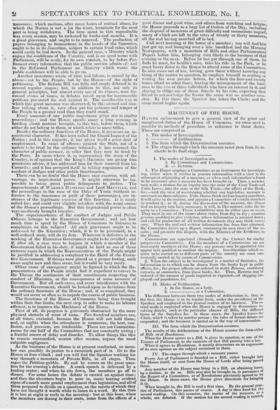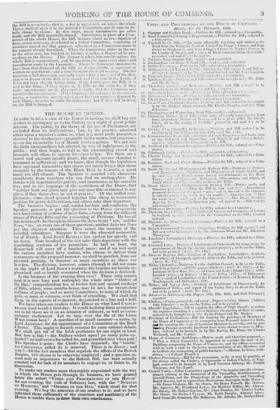MACHINERY OF THE HOUSE.
HAYING endeavoured to give a general view of the great and complicated duties of the House of Commons, we come next to consider its methods of procedure in reference to those duties. These are comprised in 1. The modes of Investigation.
2. of Deliberation.
3. The form which the Determination assumes.
4. The stages through which the measure must pass from its in- choate to its final stage.
I. The modes of Investigation are,
1. By Committees and Commissions.
2. — Returns.
I. The House employs a Committee as an instrument for investigat- ing, either when it wishes to procure information with a view to the subsequent originating of a measure, or when such information is found to be necessary after a measure has been brought in. Thus, a member may make a motion for an inquiry into the state of the Corn Trade and Corn 1.41\17S—into the state of the Silk Trade—the affairs of the Bank, &c.—with the view of ascertaining whether any legislative measure is necessary on these subjects. If the House think such an inquiry expedient, it will agree to the motion, and appoint a Committee of certain members to conduct it : or if, during the discussion of the measure, the House find an inquiry into facts necessary, it will, in like manner, refer the in- quiry to a Cpinmi ttee. These Committees may be either open Or secret. They meet in one of the rooms above stairs, from day to day ; examine persons qualified to give evidence, whose information is minuted down; and call for production of all written documents they may think neces- sary. When the oral and written information has been thus obtained, the Committee draws up a Report, containing its own views of the re- sults ; and presents this Report, with the Minutes of the Evidence, to the House.
Coimnissions are appointed (formally by the Crown) for similar purposes as Committees. But the members of a Commission are not necessarily members of the House; any persons may be appointed who appear best qualified to conduct the inquiry. Investigations which re- quire to be carried on in different parts of the country are most con- veniently carried on by means of Commissions.
2. When the subject to be investigated is a matter of Statistics, the information as to which can be drawn from the books kept in public offices, &c., the proper officers are ordered to make Returns, containing extracts, or summaries, from those books, &c. Thus, Returns maybe ordered of the amount of goods imported or exported—of shipping em- ployed—of population, &c.
II. Modes of Deliberation.
1. In the House, as a body.
9, , as a Committee.
The difference between these two modes of deliberation is, that, in the first, the House is in its regular form, under the presidency of the Speaker, and employed in the general routine of its business. The se- cond mode is employed when the House is engaged in discussions in- volving details, such as the particular clauses of Bills, the different items of the Supplies, &v. In these cases, the Speaker leaves the Chair; which is taken by another person ; the rules of formal debate are suspended; and the business is carried on in the way of conversation.
HI. The form which the Determination assumes.
The results of the deliberations of the House assume the form either of Bills or of Resolutions. When the House agrees to a Bill, it gives its sanction, as one of the Estates of Parliament, to the contents of that Bill passing into a law. When it agrees to Resolutions, it merely determines on an expression of its own opinion on the subject contained in them.
IV. The stages through which a measure passes. Every Act of Parliament is founded on a Bill, either brought into the House itself, or sent from the House of Lords after being passed there. Any member of the House may bring in a Bill, on obtaining leave,_
by a motion, to do so. Bills may also be brought in, in pursuance of the Report of a Committee, or of Resolutions previously agreed.to.by the House. In those cases, the House gives directions for bringing
it in. When brought in, the Bill is read a first time. By the general prac-
tice of Parliament, this passes of course. A day is then fixed for the second reading. On this occasion, the merits of the measure, rt.s a whole, are debated. If the motion for the second reading is carried, the Bill is commitled,-that is, a day is appointed, on which the whole House shall sit upon it in the form of a Committee, and di cuss its de- tails, clause by clause. In this stage, many amendments are often made, and the Bill materially altered. Sometimes, in place of a Com- mittee of the whole House, the Bill, in cases where an invettigation of facts seems necessary, is referred to a Select Committee, ecnsisting of members named for that purpose, who meet in a Committee-room in the manner already described. When the Committee, either in the one or the other case, has finished its labours, it makes a Report of its pro- ceedings to the House. This Report is taken into consideration; the whole Bill is reconsidered, and the question put upon every clause and amendment made by the Connnittee. When the clausesaiel rinendinents have been thus' disposed of, the Bill, as it now stands, is ngrossed, or written on parchment ; and a time fixed for the third reeding. On this occasion, a full discussion generally again takes place ; and if the dm- 8 sion is in favour of the Bill, it is passed, and then sent to the Lords, if
it has not been already before them. If the Lords pass the Bill, it is sent to the King ; if they reject it, it falls to the ercntrd ; if they ge make amendments on it, they seed it Lack, that the Cemmons may consider the amendments. If the Commons do not agree to the :untold- 11. meats, a conference usually teltis place between mee:!;tee deputed by 12. each House, in order to settle the dilfereece ; but if they fil in doing 13. so, the Bill is dropped. 14.



















































 Previous page
Previous page